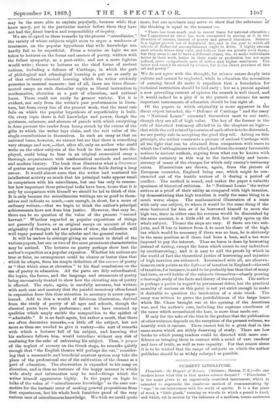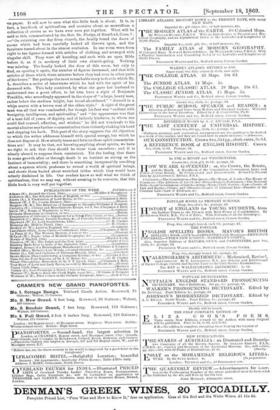CURRENT LITERATURE.
Planchette: the Despair of Science. (Roberts: Boston, U.S.)—Da oar readers know what this is that makes science despair? "Blanchette '” is the name given to an ingeniously contrived instrument, which is intended to supersede the cumbrous method of communicating by "raps " in our intercourse with the world of spirits. It is a flat piece of wood, a "little plank," running on wheels, to which a pencil is fixed, and which, sot in motion by the influence of a medium, traces sentences on-paper. It will now be seen what this little book is about. It is, in fact, a handbook of spiritualism, and contains about as marvellous a collection of stories as we have ever seen put together. What will be said to this, communicated by the Rev. Dr. Phelps, of Stratford, Conn.? : —" On returning one day from church, the family found the doors of rooms which had been carefully locked all thrown open, and the furniture tossed about in the utmost confusion. In one room were from eight to ten figures formed with articles of clothing, and arranged with singular skill. They were all kneeling, and each with an open Bible before it, as if in mockery of their own church-going. Nothing Was missing. The family locked the door of this room, but only to End, on opening it again, the number of figures increased, and that with articles of dress which three minutes before they had seen in other parts of the house." But perhaps the most remarkable story is that in which Mr. L. describes a series of interviews which he had with the spirit of his deceased wife. This lady contrived, by what she gave her husband to understand was a great effort, to let him have a sight of Benjamin Franklin, who accordingly appeared in the shape of " a large, heavy man, rather below the medium height, but broad-shouldered," " dressed in a white cravat with a brown coat of the olden style." A sight of the great
an was all that was vouchsafed ; for though his face was " radiant with benignity, intelligence, and spirituality," and "his appearance was that of a man fall of years, of dignity, and of fatherly kindness, in whom one could find counsel, affection, and wisdom," he did not vouchsafe to his mortal admirer any further communication than violently shaking his hand and slapping his back. This part of the story suggests the old objection to which the writer addresses himself with special energy, but which ho does not dispose of. How utterly inane and fatuous these spirit communica- tions are! It may be that, not knowing anything about spirits, we have no right to ask that they should be wiser than ourselves ; and it is clearly absurd to suppose them omniscient. Yet the feeling that there is some growth after or through death is an instinct as strong as the instinct of immortality ; and there is something inexpressibly revolting about a system which professes to reveal a world of spiritual beings, and shows them busied about wretched trifles which they would have utterly disdained in life. Our readers know so well what we think of spiritualism, that we may say, without seeming to be converts, that this little book is very well put together.































 Previous page
Previous page